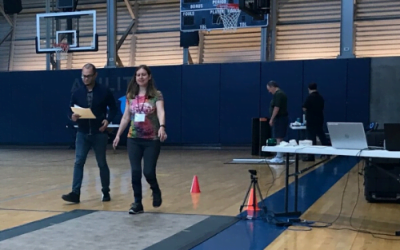HNF’s CMT Genie Update: New CMT gene discovery, CRYAB
Do you have late onset autosomal dominant CMT2 – subtype unknown, with breathing involvement, unexplained cardiac complications, and/or congenital cataracts?
A recent publication (http://tinyurl.com/mr3yp472) detailed a patient in the UK who presented in his 40s with progressive foot drop and falls. He had a normal birth and milestones, was very good at sports and had no symptoms earlier in life. His past medical history was uneventful except for bilateral congenital cataracts, which did not need surgery. Neurological examination in his early 50s showed a high stepping gait. He could not stand on either heels or toes. Muscle strength was mildly reduced in the distal upper limb muscles, and markedly reduced in the distal lower limb muscles. There was paradoxical breathing due to diaphragm weakness. Reflexes were present in the upper limbs, but absent in the lower limbs. Vibration was reduced distally in the lower limbs.
His initial diagnosis: Late onset autosomal dominant CMT2 – subtype unknown.
Ten years later, the neuropathy had moderately progressed and he needed two crutches to walk. He was also noticed to have developed mild parkinsonism with right-sided predominant tremor and rigidity. The persistent testing (whole exome) led to the identification of a previously unidentified cause of CMT – the CRYAB gene. Read the entire paper here: http://tinyurl.com/mr3yp472
A very important finding with this new subtype is that for the first time, scientists have made a distinct connection between CMT and possible cardiac complications, and between CMT and breathing involvement. Because of these potential complications with this new subtype, researchers recommend regular cardiac and respiratory monitoring for any patient who has this CMT subtype in order to identify, and possibly prevent, life-threatening cardiac complications. This CMT discovery is also the first direct connection to the possibility of cataracts, which may or may not need surgical intervention.
Researchers have identified several others who have this new CMT subtype. It is known presently as “CRYAB-CMT”, but a more conventional CMT name may emerge in the future. If any of this sounds like what you experience with your CMT, and despite all efforts testing has not revealed your gene, this might be your subtype.
Testing for this gene is now available. Get genetic counseling and request at-home testing via HNF’s CMT Genie initiative by setting up an appointment with a genetic counselor today: http://www.cmtgenie.org/











0 Comments